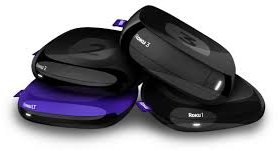Difference between revisions of "Roku"
(→ROKU 2) |
|||
| (9 intermediate revisions by 2 users not shown) | |||
| Line 96: | Line 96: | ||
Wikipedia contains an excellent version table comparing all the different versions of ROKU devices currently on the market. This table can be found at [[http://en.wikipedia.org/wiki/Roku Wikipedia: Roku]] | Wikipedia contains an excellent version table comparing all the different versions of ROKU devices currently on the market. This table can be found at [[http://en.wikipedia.org/wiki/Roku Wikipedia: Roku]] | ||
== | == Frist generation == | ||
Roku DVP (N1000), Roku SD (N1050), Roku HD (N1100), Roku HD-XR (N1101), Roku HD (2000), Roku XD (2050), and Roku XDS (2100) are the first generation of ROKU devices contained a PNX8935 MIPS SoC | |||
== | == Second generation == | ||
Roku LT (2400), Roku LT (2450), Roku HD (2500), Roku 2 HD (3000), Roku 2 XD (3050), Roku 2 XS (3100) Roku Streaming Stick (3400, 3420), BSkyB Now TV are the second generation of ROKU devices contained the Broadcom 2835 ARM SoC which is identical to the Raspberry PI. | |||
== | == Third Generation == | ||
Roku LT (2700), Roku 1 (2710), Roku 2 (2720), and Roku 3 (4200) are the third generation Roku devices contained the BCM7218 SoC. Roku 3 (4200) contained the BCM11130 SoC. | |||
== Exploiting Roku Devices == | |||
* [[Exploiting Roku]] | |||
Latest revision as of 21:41, 28 December 2013
"Although the information we release has been verified and shown to work to the best our knowledge, we cant be held accountable for bricked devices or roots gone wrong."
This page will be dedicated to a general overview of the Roku OS, descriptions, and information related to the Roku Streaming Player.
Purchase
Buying devices is expensive and, in a lot of cases our testing leads to bricked equipment. If you would like to help support our group, site, and research please use one of the links below to purchase your next device.
GPL
Roku maintains a fairly accurate (but far from perfect) repository of GPL code which can be found at [roku.com/opensource].
Secret Screens
|
|
|
Versions
Wikipedia contains an excellent version table comparing all the different versions of ROKU devices currently on the market. This table can be found at [Wikipedia: Roku]
Frist generation
Roku DVP (N1000), Roku SD (N1050), Roku HD (N1100), Roku HD-XR (N1101), Roku HD (2000), Roku XD (2050), and Roku XDS (2100) are the first generation of ROKU devices contained a PNX8935 MIPS SoC
Second generation
Roku LT (2400), Roku LT (2450), Roku HD (2500), Roku 2 HD (3000), Roku 2 XD (3050), Roku 2 XS (3100) Roku Streaming Stick (3400, 3420), BSkyB Now TV are the second generation of ROKU devices contained the Broadcom 2835 ARM SoC which is identical to the Raspberry PI.
Third Generation
Roku LT (2700), Roku 1 (2710), Roku 2 (2720), and Roku 3 (4200) are the third generation Roku devices contained the BCM7218 SoC. Roku 3 (4200) contained the BCM11130 SoC.
